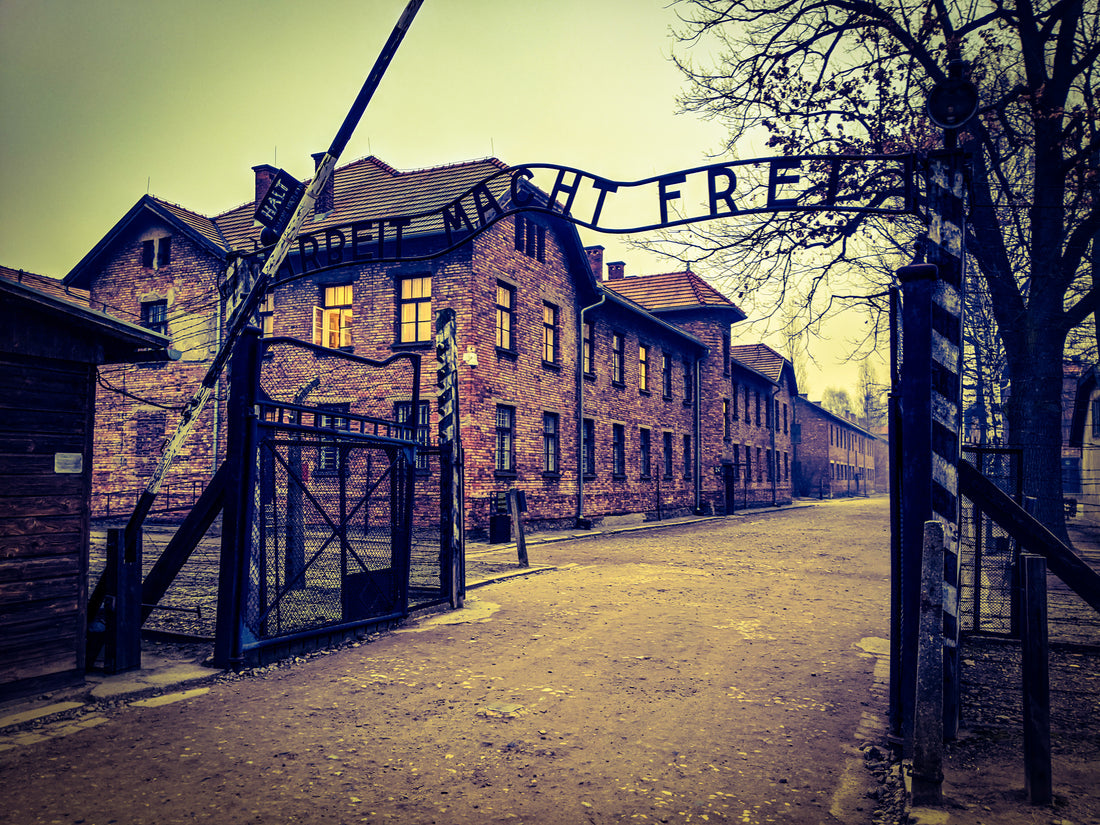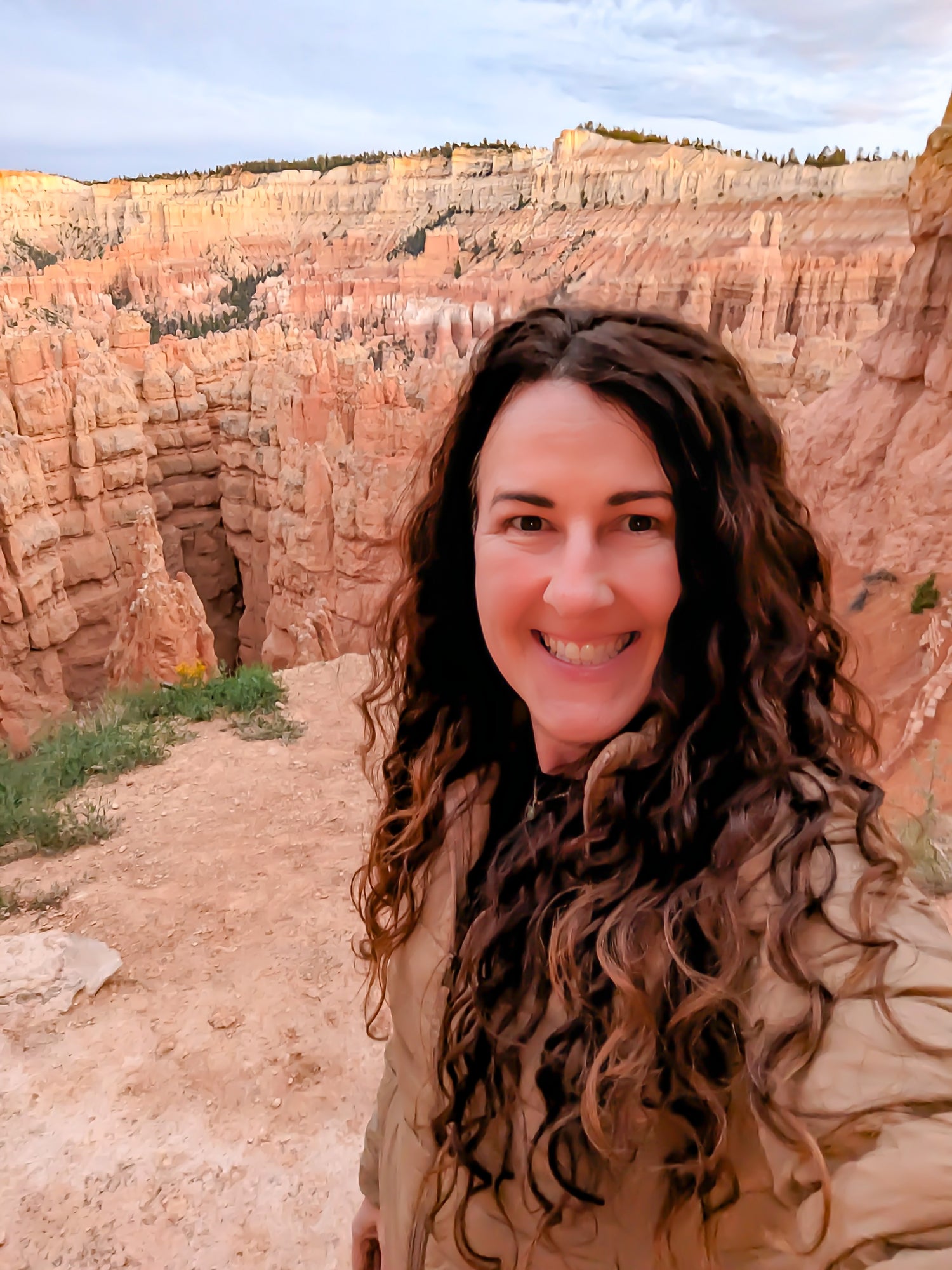In January 2020, I attended the 75th Anniversary of the Liberation of Auschwitz as a member of the press. This was my first time visiting a former Nazi Concentration Camp.
I wrote this free-verse poem shortly after I visited the memorial on an unguided solo tour. Hopefully a little of what I felt that day is conveyed in these words.
I Wasn't Alone
Fog hung low
over icy farm fields
girthing the earth
in an eerie blanket while
a scarlet sun—
made red by thick
wood-smoke—
barely filtered its
rays
through the
heavy particulate-laden air.
The scene was
every shade
of gray—
Cinerous
Obsidian
Flint
Ash
—as I drove down the long
stretch of road that was only
occasionally
interrupted at intersections with
serpentine roundabouts.
A short fifteen-minute
drive and I was there.
Opening hour
in frigid January
equals
no crowds
and plenty of parking
near the entrance where
placards highlighting
the lives of
the murdered
stood like
tombstones—
the only collective marker
for the many millions of souls lost here.
Beyond the
security entrance,
the
L
O
N
G
dirt path towards the main gate
was bordered
by old splintery barracks
and dragon fencing
that pierced the
foggy air
with its razor sharp
electric wires.
The metal beams,
arched like snakes,
pointed inwards towards
the belly
of the insidious beast.
Just steps around the corner,
I saw it for the first time.
The gate.
That infamous gate
that I'd seen
millions of times
in school textbooks,
documentaries, and
old black-and-white
photographs.
But this wasn't in
black and white—
this wasn't a film,
or a faded photograph
from the past.
This scene was real.
I was here,
staring with
my very own eyes
at one of the creepiest
gates
in history.
Arbeit Macht Frei. "Work Makes You Free."
Those three German words
that spoke the great lie,
that there was freedom from
this factory of death if only
one worked hard enough.
I was at the entrance to Auschwitz.
I walked through the gate.
And even though
as a lifelong student of history,
I had always
wanted to visit this place to
perhaps pay some respect
to those who had lost their lives
so tragically here,
at that
precise moment as I stepped
under that infamous gate,
trepidation crept over me
like a thick, inky fluid.
My heart began to race
as the foggy air seeped deep
through my thick layers
and penetrated
my bones.
If it had been just 75 years before,
this
seemingly
simple act of
w
a
l
k
i
n
g
through a gate
would have ended very differently.
Afterall, most who walked into
Auschwitz
did not walk back out.
And here I was walking
WILLINGLY
into this place
that had been the site
of such hell for so many.
With each step,
I felt that dragon wire
fence
bear down on me,
the weight of the
dismal fog,
the smell of the
intense
wood
smoke,
the precipitation of
ash
from nearby homes and
their wood-burning
stoves.
If this had been 75 years ago,
that ash would have been. . .
. . .I stopped myself
in mid-thought,
my heart
continuing to race,
my
breath
expelling clouds of
winter smoke
in the frigid Polish air,
as I walked
further
and
further
into the site of
the Nazi's factory of death.
Early morning at Auschwitz
in January
is a
solitary
experience.
No big organized tours yet.
Only small groups who walk
through
the complex
on their own.
I was one of only a handful
of visitors
on this cold January morning.
Only occasionally did I see
another soul
—in
the
far
distance—
as I walked
alone
through Auschwitz.
The old brick buildings—
rows and rows of them
which had once been barracks,
and scenes of
unthinkable
cruelty
were now
museums.
I entered the first
on my self-guided tour.
Videos played in the background,
exhibits showing
the normal lives of the victims
before they were forced into the camp.
Photographs detailed
.....Where they came from
.......What they did for jobs
.......What they believed and who they loved.
All the basic elements of humanity
that were stripped
away
at Auschwitz.
Behind the glass in one exhibit
were piles of rusty old pots and pans,
in another was
shaving brushes,
razors,
and
suitcases marked with names
and transport numbers.
Who would want this stuff?
It was just the everyday belongings
of people.
Nothing special.
Nothing extraordinarily valuable.
Just stuff.
One floor housed
mounds of
shoes
women's summer sandals
.....men's business shoes
...........children's dress shoes
. . .
...................babies' booties.
Why take someone's old, used shoes?
Why would anyone want any of this?
In each building,
the items on display
became
more appalling.
Prostheses piled high
behind the glass in one
exhibit.
These were the most
precious belongings of
the physically challenged.
These devices allowed them
to walk
.....to move
..............to try to lead normal lives.
Some in the piles
were even the
wooden legs
last worn by German World War I veterans
who had (ironically)
fought
—and given their limbs—
for what they had always believed
was THEIR homeland.
Why take someone's prosthesis?
Why?
And then there was the
hair.
Mounds and mounds
of hair—
stolen
off the heads of the
very people
who were then
forced to make
fabric
and
stuffed pillows
out of it
like it was just
wool
........cotton
...................silk.
Hair.
Human hair.
Hair?
Why?
The answers
to all my questions
were clear
—and
one that I had obviously
known my entire life.
The Nazis involved
in these crimes were
CRUEL,
DIABOLICAL
PYSHOTIC
MONSTROUS individuals
who were
drunk
with
gluttony
and pure evil.
They wanted it all.
Everything.
Anything.
ALL
OF
IT.
First it was the beautiful belongings
..........the art
..............the jewelry
..................the silver
Then it was the everyday belongings
.............the old rusty pots and pans
.................the clothes, shoes, razers, brushes, eyeglasses, prosthesis
Then it was the people themselves.
The Nazis wanted it all.
And they wanted to control who "deserved" to live.
In most of these buildings,
I walked
alone.
No other visitors.
No Auschwitz employees.
No one.
All alone in buildings where
unthinkable hell
had occurred.
It was like visiting the
most terrifying
haunted house
you could imagine
all
by
yourself.
The feeling of doom—
that heavy weight
from the evil cloud
that hung over Auschwitz—
never
ever
left me
during my entire visit that day.
In fact,
.........in each building,
..............along each path,
it only intensified.
At one point,
in one building
where some of the
most despicable things had
happened at Auschwitz,
I immediately had the
urge to
F
L
E
E.
To get out of that
building
as fast as possible
"I need to get the
hell out of here,
NOW!!!!"
Out the door,
out the window,
I didn't care.
I just had to get out of there.
I had to escape
the evil that was all around me,
suffocating me.
And I did.
After rushing through
the mazelike rooms and exhibits,
I finally found my escape.
At the far end of the dark
corridor,
stood a rectangle of light
that framed the
outside door
of the
building.
As soon as I saw it,
I instinctively
R
A
N!!!
I pushed my way
through the
thickness
of the air in that
doom-filled structure
and
flung open the heavy
wooden door.
I was outside.
I kept on moving
all the way to the main
entrance
and through
that
infamous gate.
As soon as I passed through it,
I knew the imposing fence
with its razor sharp
dragon
wires were finally
beyond reach,
and so was the eerie
creepiness
of all that had happened
at Auschwitz.
I was free.
I had always wondered what
Auschwitz would feel
like.
I assumed it would feel
like a cemetery.
That I would be surrounded
by a sense of
sadness for
what had occurred
and the people
who had died in this
horrid place.
Yet, on that day,
sadness never had a
place to find room
in my heart.
All I could feel
was
profound
FEAR.
I imagine
those are the exact
same feelings
that all those
poor souls
who were
brought here
more than 75 years ago
on
cattle cars and
separated from their
beloved families
on a dead-end
train platform
would have also felt.
And in that way—
with these shared emotions—
I was not alone
that day at
Auschwitz.
I had been with each one of them.
Postscript
Within 24 hours of having this experience, I was walking on the soil of Jerusalem. At the time I made the decision to go to Israel after Poland, I didn't realize what a profound choice this would be. At Auschwitz, I had visited the deepest depths of hell on Earth, and then without even a night's sleep between, I was strolling through one of the most peaceful, comforting cities I had ever visited. It made my heart happy to see this thriving country of Israel, built mostly after the hells of the Holocaust, and in some ways because of it. Many survivors became leaders here and helped build Israel into one of the most amazing countries on Earth. The Nazis and their hatred and despicable goals did not win. This is a profound example that in the end, good always triumphs over evil.
Two years after this experience, I was invited to attend a press workshop at Auschwitz. At first, my heart raced at the very thought of returning. It wasn't something I ever planned on doing. However, the educational opportunities offered by the press office looked so interesting and thoughtful that I ultimately decided to go. I wanted to experience Auschwitz from a different perspective, and a group press tour would be the most ideal situation I could imagine.
It seems odd to say this, but my second visit to Auschwitz was actually a positive one. The press office made sure they provided enriching educational opportunities for us during our three-day workshop. They showed us how the staff at Auschwitz strives to preserve the site in an effort to keep the memory of what happened here alive, and by so doing, keeping the memory of the victims alive. I was comforted to see these behind-the-scenes efforts because it helped me realize that this truly is no longer a camp, but rather a memorial striving to remind the world of the horrors of hate. When I visited Auschwitz-Birkenau—the part of the camp that I didn't get to see on my first visit—I felt the deep sense of sadness that I thought I would experience on my first trip. Because I was no longer alone, I could take in everything in a safer space and really feel the sadness that permeates from the barracks walls and the environ itself.
In the end, I'm glad I had both experiences at Auschwitz, the scary and the sad, because both feelings really were part of the victims' experience, too.
Would I recommend going to Auschwitz or any of the other former Nazi concentration camps?
Yes, I would. I think it's really important for people to experience these places.
Just go in fully aware of the strong emotions you will feel there. And, honestly, I would suggest going in a group. The solo venture here is so intense and overwhelming that I wouldn't fully recommend it.
Resources to learn more
Auschwitz-Birkenau Memorial and Museum Official Site
Learn More About the Holocaust
What People Know About the Holocaust


